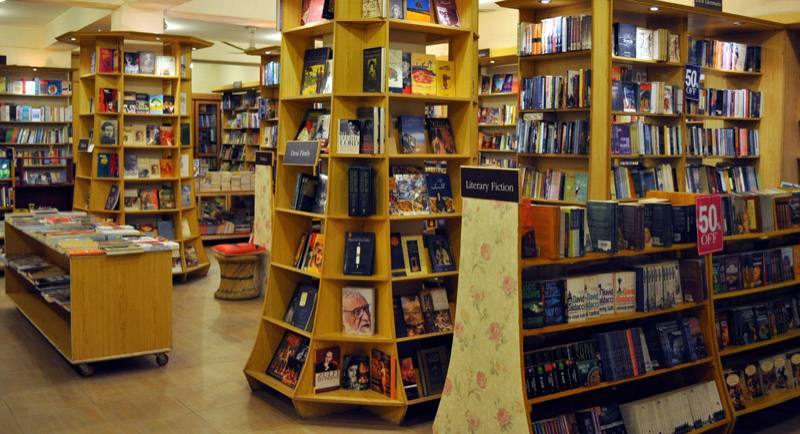
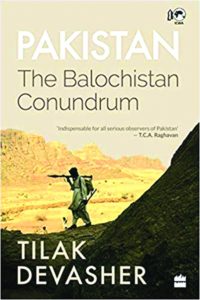
Pakistan: The Balochistan Conundrum
Tilak Devasher
HarperCollins Publishers India (2019)
Balochistan, Pakistan’s largest province, is a complex region fraught with conflict and hostility, ranging from an enduring insurgency and sectarian violence to terror strikes and appalling human rights violations. In his third book on Pakistan, Tilak Devasher analyses why Balochistan is such a festering sore for Pakistan. With his keen understanding of the region, he traces the roots of the deep-seated Baloch alienation to the princely state of Kalat’s forced accession to Pakistan in 1948. This alienation has been further solidified by the state’s rampant exploitation of the province, leading to massive socio-economic deprivation. Is the Baloch insurgency threatening the integrity of Pakistan? What is the likelihood of an independent Balochistan? Has the situation in the province become irretrievable for Pakistan? Is there a meeting ground between the mutually opposing narratives of the Pakistan state and the Baloch nationalists? Devasher examines these issues with a clear and objective mind backed by meticulous research that goes to the heart of the Baloch conundrum.
Tilak Devasher has taken to writing after he retired from the cabinet secretariat, Government of India, as special secretary in 2014. He is the author of two widely acclaimed books on Pakistan-Pakistan: Courting the Abyss (2016) and Pakistan: At the Helm (2018). During his professional career with the cabinet secretariat, he specialized in security issues pertaining to India’s neighbourhood. Post retirement, he has continued to take a keen interest in India’s neighbourhood, with special focus on Pakistan and Afghanistan. He has written articles for various national newspapers and magazines and has also appeared on TV shows on leading news channels like India Today, Times Now, CNN News18 and Rajya Sabha TV. Devasher did his schooling from Mayo College, Ajmer, and studied history at St Stephen’s College, Delhi, at the undergraduate level and at the University of Delhi at the postgraduate level. He is currently a member of the National Security Advisory Board (NSAB) and a consultant with the Vivekananda International Foundation (VIF).
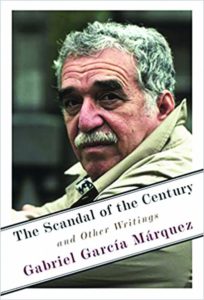
The Scandal of the Century: And Other Writings
Gabriel García Márquez
Knopf Doubleday Publishing Group (2019)
This incisive collection of journalistic pieces from the 1950s to the ’80s shows the acclaimed novelist and short story writer García Márquez (1927–2014) in his original guise, as reporter, which he called “the best job in the world.” Even in short-form pieces, the Colombian Nobel laureate’s skill at creating character, mood, and setting shines through, whether he is commenting on water shortages in Caracas, describing Budapest soon after the Soviet invasion, or exposing sex trafficking and prostitution in Paris. The early pieces are for the Colombian newspaper El Espectador, which afforded García Márquez his first opportunity to travel abroad, as a roving correspondent in Europe, and the later examples mostly come from his column in the Spanish newspaper El País. The centerpiece is the eponymous work, a compilation of several columns from Rome describing a young woman’s mysterious death, a detective novel-like narrative accompanied by perceptive commentary on the role of press and public opinion. As with any collection, some selections are more successful than others, but all reflect García Márquez’s humor, graceful style, and ability to find the human interest in every topic. His many Anglophone fans will be pleased to have these newly translated examples of his writing to read.
Gabriel García Márquez was born in Colombia in 1927. He was awarded the Nobel Prize in Literature in 1982. He is the author of many works of fiction and nonfiction, including One Hundred Years of Solitude and Love in the Time of Cholera. He died in 2014.
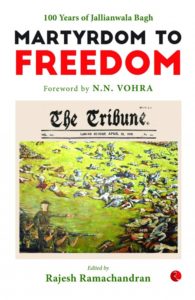
Martyrdom to Freedom
Rajesh Ramachandran
Rupa Publications India (2019)
Nothing signifies the supreme sacrifice, the million martyrdoms, and the insufferable yoke of colonial rule more than the memory of the Jallianwala Bagh massacre of 1919: the merciless murder of nearly a thousand peaceful protesters without warning, till the ammunition ran out. The wounded were left to die without even a drop of water or the solace of a comforting hand. This was, undoubtedly, the pivotal event that turned loyal subjects of the Empire into revolutionaries—armed and unarmed. The poet-philosopher Rabindranath Tagore returned his knighthood, Gandhi gave up his Kaiser-e-Hind gold medal and the people of India rejected the British rule as a brutal, racist, master-slave relationship. Nobody investigated the massacre as deeply as The Tribune. While the entire Anglo-Indian press was applauding General Dyer for having perpetrated this mass murder, it was only The Tribune that questioned the British government. Martyrdom to Freedom stands testimony to The Tribune’s commitment to fearlessly observing, and acting as a chronicler of, colonial atrocities. In the centenary year of this epochal tragedy, this book brings together essays of some of the best known authors, thinkers and historians of modern India, alongside priceless articles from the archives of the newspaper, dating back to 1919.
With profound insights and personal testaments, Martyrdom to Freedom is a valuable addition to recorded history.
Rajesh Ramachandran, editor of The Tribune, is a journalist who has worked with some of India’s largest publications and TV channels. He has reported on war and insurgency, and written on politics, political economy, government affairs and conflict. He has earlier served as the editor-in-chief of Outlook.
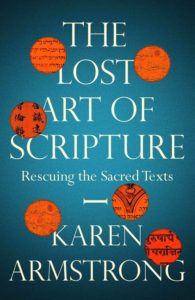
The Lost Art of Scripture: Rescuing the Sacred Texts
Karen Armstrong
Knopf Doubleday Publishing Group (2019)
Today the Quran is used by some to justify war and acts of terrorism, the Torah to deny Palestinians the right to live in the Land of Israel, and the Bible to condemn homosexuality and contraception. The significance of Scripture may not be immediately obvious in our secular world, but its misunderstanding is perhaps the root cause of many of today’s controversies.
In this timely and important book, one of the most trusted and admired writers on the world of faith examines the meaning of Scripture. The sacred texts have been coopted by fundamentalists, who insist that they must be taken literally, and by others who interpret Scripture to bolster their own prejudices. These texts are seen to prescribe ethical norms and codes of behavior that are divinely ordained: they are believed to contain eternal truths. At a time of intolerance and mutual incomprehension, The Lost Art of Scripture shines fresh light on the world’s major religions to help us build bridges between faiths and rediscover a creative and spiritual engagement with holy texts.
Karen Armstrong is the author of numerous books on religious affairs, including The Case for God, A History of God, The Battle for God, Holy War, Islam, Buddha, and The Great Transformation, as well as a memoir, The Spiral Staircase. Her work has been translated into forty-five languages. In 2008 she was awarded the TED Prize and began working with TED on the Charter for Compassion, created online by the general public, and crafted by leading thinkers in Judaism, Christianity, Islam, Hinduism, Buddhism, and Confucianism. The charter was launched globally in the fall of 2009. She is currently an ambassador for the United Nations Alliance of Civilizations.
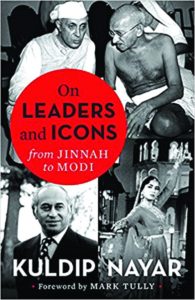
On Leaders and Icons: From Jinnah to Modi
Kuldip Nayar
Speaking Tiger Books (2019)
A legendary journalist’s close encounters and candid profiles of the powerful, the famous, the glamorous and the rich—from Nehru, Jinnah and Sheikh Abdullah to Meena Kumari, Indira Gandhi and Narendra Modi.
In this frank and freewheeling narrative, Kuldip Nayar recounts his experiences of meeting many of the men and women who shaped the destiny of pre- and post-Independence India, revealing hitherto unknown aspects of their personalities and shedding light on many key events in the country. Was Nehru a secret dynast who had only his daughter Indira Gandhi in mind as his successor? What role did Nayar himself play in Lal Bahadur Shastri’s election as prime minster after Nehru’s death? Why did Khan Abdul Ghaffar Khan—revered as the Frontier Gandhi—refer to Indians as ‘baniyas’? And who did Zulfikar Ali Bhutto think should be the prime minister of the entire subcontinent—India, Pakistan and Bangladesh?
Interspersed with these political reminiscences are delightful accounts of Meena Kumari’s encounter with Shastri on the sets of Pakeezah, and Faiz Ahmed Faiz’s flawless recitation of his great poetry even after consuming a full bottle of Black Dog whiskey.
Nayar does not fight shy of expressing his opinions—be it a comparison of JRD and Ratan Tata, advice for Narendra Modi, or reflections on the shape of Indo-Pak relations had Mahatma Gandhi and Mohammed Ali Jinnah lived longer.
In this absorbing and entertaining book—which he finished only weeks before he passed away—Kuldip Nayar writes in the grand old tradition of journalists who were not afraid to tell it like it is.
Kuldip Nayar (1923-2018) began his career as an Urdu reporter in the 1950s. He moved to English journalism with the United News of India (UNI) which he was instrumental in setting up. He later became editor of the Delhi edition of ‘The Statesman’, and also had a long association with the ‘Indian Express’. An outspoken critic of Indira Gandhi, he was arrested during the Emergency years (1975-77). He was also a human rights activist, and a member of India’s delegation to the United Nations in 1996. He was appointed high commissioner to the UK in 1990 and nominated to the Rajya Sabha in 1997.

